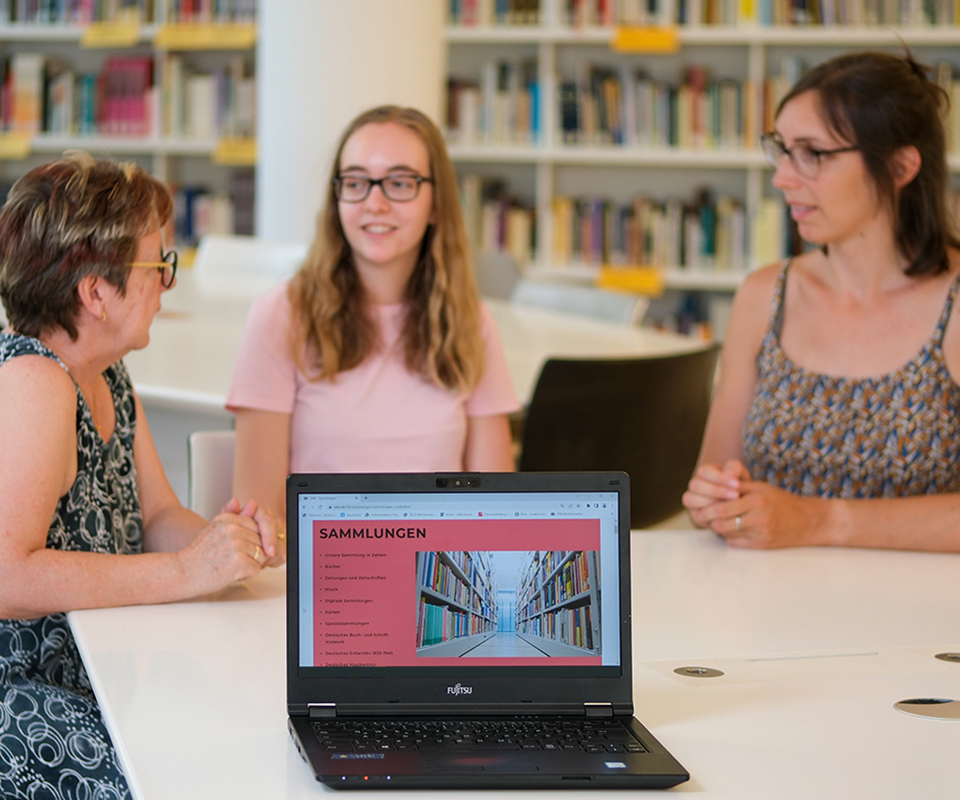Presenting collections digitally
 Photo: Stephan Jockel
Photo: Stephan Jockel
Promoting data work and improving search options – for everyone
The development of digital access to the DNB’s holdings continues to progress. The DNB has taken a number of steps to achieve this in 2024. Through numerous projects, the library has further established itself as a partner in the digital humanities: as a data provider, a mediator of knowledge and skills, and a research partner. Conditions for academic research in collections were improved and standardised identifiers were established further. Also efforts were made in modernising the catalogue system and new services were created – not least for school students.
New workshops at the DNBLab
The DNB supports digital humanities, for example by providing digital data. Users can access digital resources via the DNBLab. Virtual educational formats support them in their work with the data. The offerings for this were expanded in 2024. There were new data sets, tutorials, and handouts—and more workshops in a new structure. These included introductory events as well as workshops for experts to deepen their knowledge in specific areas. The DNBLab workshops always cover practical topics (metadata analysis, data preparation, or access options) and were well attended another year.
DNBLab goes university
 Photo: DNB, Stephan Jockel
Photo: DNB, Stephan Jockel
In fall 2024, the DNBLab also entered into teaching partnerships with universities such as HTWK Leipzig and the University of Mainz. These events gave students the opportunity to improve their data skills and try out what is possible with text and data mining. The teaching partnerships brought more students into contact with the services offered by the DNBLab.
Actively promoting research on digital data
Through the Digital Humanities scholarship program, the DNB actively promotes research on its digital data collections every year. In 2024, four exciting projects dealing with current research questions were once again funded. The final reports of the funded research projects are now being published in open access in the newly created series “Reports from the DH Funding Programs of the German National Library”. The first reports from the previous funding phases can already be viewed online.
Special workstations for the digital humanities?
In Leipzig, there are plans to create special workstations for the digital humanities. With the reopening of the reading rooms, it will be possible to work with copyright-protected digital objects at these workstations.
However, the DNB's goal of presenting its collections more digitally does not only include promoting data work. The digital research options in the collections are also being continuously expanded.
KorAP: Scientific search in the DNB collection
The new corpus analysis platform KorAP@DNB enables researchers in Linguistics and German studies to conduct research in contemporary literature. KorAP has been developed since 2012 at the Leibniz Institute for the German Language (IDS), among others. Since last year, the open source platform has also been installed on the DNB infrastructure. The texts are automatically annotated with detailed information on the basic form (lemma) and part of speech for each word. This allows for complex scientific searches, opening up completely new ways of exploring literature digitally.
20 years of the German Book Prize: A new text corpus for KorAP

In October 2024, the German Book Prize celebrated its 20th anniversary. To mark the occasion, an additional text corpus was integrated into KorAP. All digitally available titles nominated for the German Book Prize since 2005 can now be searched there. The German Publishers and Booksellers Association, which organises the German Book Prize, has supported the provision of this collection of outstanding contemporary literature.
Link to KorAP@DNB: https://korap.dnb.de/
Link to the German Book Prize in KorAP@DNB: https://korap.dnb.de/deutscherbuchpreis
Establishing ISNI more firmly in the book market
Working with authority data is always part of improving search options. Since 2024, there has therefore been a new cooperation between the German National Library and MVB. The aim of the collaboration is to establish the International Standard Name Identifier (ISNI) across the German-speaking book market. This will improve the unique identification of works and authors. This is helpful not only for research, but also for marketing media.
Introductions into catalogue research: collaboration with schools
At the beginning of 2024, the DNB changed its terms of use and lowered the age limit to 16. Since then, more and more pupil have been using the library. They often do not immediately know how to best use the online catalogue to find what they need. The DNB has therefore evaluated the requirements of curricula and examination regulations as well as requests from teachers. Based on this evaluation, a modular introductory program has been developed to teach pubils research skills. In the fall, the DNB's user services department made initial contact with schools to publicise the program.
We also continued to offer these services in 2024
Last changes:
18.06.2025





